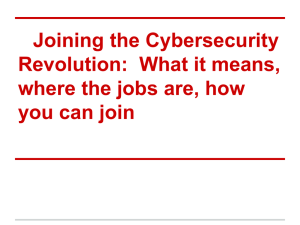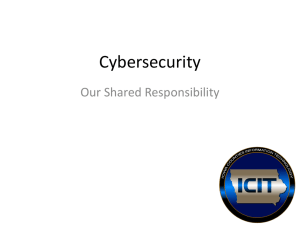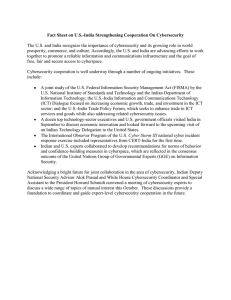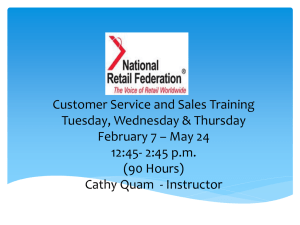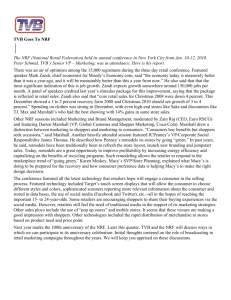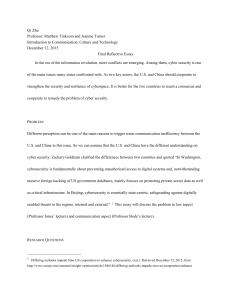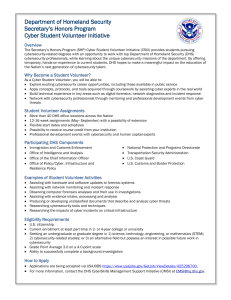RETHINKING ORC: NRF’S CYBER SECURITY EFFORTS
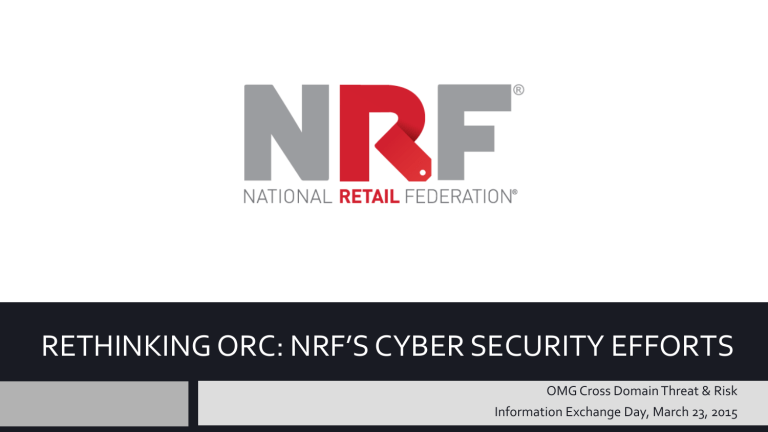
RETHINKING ORC: NRF’S CYBER SECURITY EFFORTS
OMG Cross Domain Threat & Risk
Information Exchange Day, March 23, 2015
No
Organization is
Secure
Source: http://www.informationisbeautiful.net
An Average Day in an Enterprise Organization
Every
1 min
a host accesses a malicious website
Every
3 mins a malicious bot is communicating with its command and control center
Every
9 mins a High Risk application is being used
Every
10 mins a known malware is being downloaded
Every
27 mins an unkown malware is being downloaded
Every
49 mins sensitive data is sent outside the organization
Every
24 h a host is infected with a malicious bot
Source: Check Point Security Report 2014
The Retail Industry is a Lucrative Target
Volume of investigations increased
54 percent
in 2013, compared to 2012
45 percent
of data thefts involved non-payment card data
E-commerce made up
54 percent
of assets targeted –
up 5 percent YOY
Point-of-sale (POS) breaches accounted for
33 percent
of all investigations
US retailers accounted for
59 percent
of the victims –
4x any other country
71 percent
of compromise victims did not detect breaches themselves
Source: 2014 Trustwave Global Security Report
Cybercrime: By the Numbers…
40M, 70M – number of credit and debit cards stolen from Target between Nov. 27 and Dec.
15, 2013, and the number of records stolen that included PII data of Target customers
46%, $148M – the percentage drop in profits at Target in 4Q2013 YOY, and the estimated cost to Target for their fiscal 2Q2014 responding to the data theft
$100M, 0 – the number Target says it will spend upgrading to EMV (Chip & PIN), and ZERO : the number of customer cards that EMV would have been able to stop the bad actors from stealing from Target
$2,500-$6,500 – the estimated cost to hackers for POS malware advertised in online freelance IT marketplaces
$18.00-$35.70, 1-3M, $53.7M
– the median price range per card stolen and resold on the black market, and the number of stolen Target customer cards successfully sold on the black market and used for fraud, and the income that hackers likely generated
$198,234.93
Gameover Zeus
CryptoLocker
NRF’s Technology Leadership Community
CIO Council
An invitation only committee made up of retailing’s most prominent chief information officers.
IT Security Council
An invitation only committee made up of retailing’s leading technology security experts.
Association for Retail Technology Standards (ARTS)
A worldwide community of retail business and information technology professionals organized to help retail enterprises and solution providers identify, adopt and integrate current and emerging technologies into their organizations, strategies and operations.
NRF’s IT Security Council
Providing a forum for networking and collaboration and exchange of information, develop and share industry best practices and key components of an effective security and risk management framework, and be the voice to the Hill in educating lawmakers on what is needed to combat data theft and the resulting fraud that occurs.
Networking and communications
Real-time information exchange
Benchmarking, research and publishing
Conference planning and education programs
Industry representation regarding Policy and Advocacy
NRF Threat Alert System
Facilitating Real-Time Information Exchange
Partnering with FS-ISAC, US government (NCCIC, US CERT, US
Secret Service), and private sector intelligence providers
Averages 12-15 structured alerts per day
Coded by Incidents, Threats,
Vulnerabilities and Resolutions
TLP Protocol enforced
Separate collaboration portal
IT Security Webinar Series
Education
Target POS Malware Debrief
P2P Encryption & Tokenization: Ready for Primetime!
Planning a Secure Payments Strategy
Switching Gears: PCI DSS 3.0
Merchant Considerations for US Chip
Migration
Securing Retail Performance and
Growth
Benchmarking, Research & Publications
“Stay left of boom”
1.
Act like a CSI…
2.
Build the muscle of a first line of defense…
3.
Have an actionable Incident Response Plan…
4.
Watch your supply chain…
5.
Think of all your threat vectors…
6.
Wall off your most critical data…
7.
Share your intelligence…
8.
Become the hunter…
“Your adversary has to be right 100% of the chain [of events].
You only have to break it in one place.”
Source: Sondra Barbour, EVP, Lockheed Martin, notes from the Gartner Symposium, October 2014
Understanding Cyber Risk Management
1.
2.
3.
4.
5.
How is our executive leadership informed about the current level of cyber risks to our company?
How is security reflected in our culture?
What individuals within the company are responsible for aspects of cybersecurity, including network security, physical security, breach response, and risk mapping? Do we have a formally designated, qualified Chief Information Security
Officer or equivalent?
How does our cybersecurity program apply industry standards and best practices, including the NIST Cybersecurity Framework?
How have we prioritized cybersecurity risks, and what is our plan to address identified risks? Do we consider cybersecurity risks up-front in new business initiatives and new technology implementations?
How do we manage risk related to vendor access to our systems and information?
6.
7.
8.
9.
How many and what types of cyber incidents do we detect in a normal week? What is the threshold for notifying our executive leadership?
How mature is our cyber incident response plan?
How often is our incident response plan tested and what were the results of the latest test? Does it include a communications strategy?
Do we have a relationship with other security personnel in our sector and law enforcement (local,
FBI, U.S. Secret Service) that could be leveraged in the event of a breach?
How do we monitor cybersecurity risk on an ongoing basis, and what are the key metrics?
10.
Do we have cyber-insurance coverage to offset some of our cyber-risk, and what does the policy cover?
Source: Actions to Address Retail Cybersecurity Risk: Considerations for CEOs, NRF and The Chertoff Group, September 2014
Thank You!
Tom Litchford
VP, Retail Technologies
National Retail Federation litchfordt@nrf.com
202/626.8126
Anatomy of a
Large US
Retailer
Breach
Source: Mandiant M-Trends 2015
